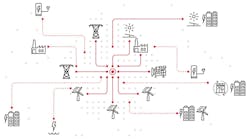ISO New England Inc., the operator of the region's bulk power system and wholesale electricity markets, has released findings of an assessment of the potential impact of Hurricanes Katrina and Rita on New England's electric generation capability for the coming winter.
Overall, as widely reported elsewhere, New England can expect the high cost of fuel, particularly natural gas and oil, to continue through the November-through-March heating season as supplies from the Gulf of Mexico remain uncertain due to heavy hurricane damage to offshore drilling infrastructure and onshore refining capacity.
Gordon van Welie, president and CEO of ISO New England, said, "Based on our experience with extreme winter conditions, including the Cold Snap of January 2004, ISO New England is planning for contingencies and implementing mitigation measures to prepare the region's bulk power system for any negative impacts that the hurricanes may have caused on the fuel supply for electricity. And to ensure a reliable supply of electricity this winter, we need all businesses and consumers to take precautionary steps by becoming more energy efficient and conserving electricity, consistent with their own health and safety needs."
van Welie added, "Mild winter weather would likely ease any pressure on electricity supply. Still, the new assessment reinforces the ISO's long-standing call for greater fuel diversity throughout New England. This vital step would ensure a more reliable supply of electricity for the region's 14 million residents."
New England is highly reliant on natural gas and oil for both electric generation and heating. Because 75-90 percent of wholesale electricity costs can be traced directly to fuel prices, consumers can anticipate higher than normal electricity bills this winter.
Key Findings
The assessment, which focuses on impacts of the hurricanes on fuel supplies for New England electric generation, reaches several key conclusions, including:
-- This winter, a significant amount of natural gas production may not be available to interstate pipelines serving the Atlantic seaboard. Consequently, natural gas and wholesale electricity prices will remain high throughout the heating season.
-- New England has diverse natural gas supplies, including strong pipeline connections with Canada and imported liquefied natural gas (LNG). However, the region depends on two major interstate pipelines to bring in Gulf Coast natural gas. To the extent supply or delivery constraints arise, most of the region's gas-fired power plants could be adversely affected as a result of the "non-firm" character of their gas supply and transportation services.
-- ISO New England can mitigate this winter's natural gas situation in part by increased use of oil-fired power plants. Supplies of fuel oil available to power plants and storage facilities accessible by barge or tanker ships are likely to be adequate for the winter. However, harsh winter weather could pose logistical challenges for truck-transported fuel oil shipments to some power plants, thereby affecting the reliability of fuel deliveries.
-- Commercial demand reduction, such as demand response, as well as residential energy efficiency and conservation initiatives will play an integral part in ensuring the reliability of the region's bulk power system for the 2005-06 heating season.

